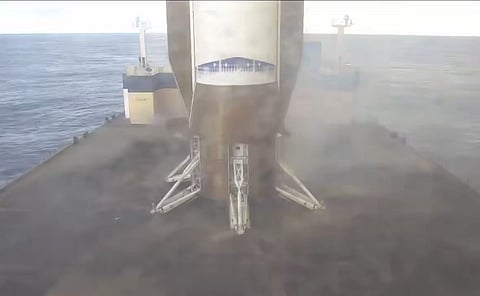New Glenn sends 2 satellites on the way to Mars, nails landing on drone ship 'Jacklyn' — fresh milestone for Jeff Bezos' Blue Origin
Event shows the billionaire's rocket nailing reusability, potentially cutting launch costs

Blue Origin, the aerospace company founded by Jeff Bezos, successfully landed the first stage of its 'New Glenn' rocket on a drone ship at sea after lifting two Nasa spacecraft toward Mars, a significant achievement for the company.
This marks a major milestone with the successful launch of its New Glenn rocket from Cape Canaveral, Florida.
Aboard the powerful heavy-lift launcher were two NASA spacecraft — twin Escapade satellites — now on a 22-month journey to Mars.
Mars mission
Once they arrive, the probes will enter orbit around the Red Planet to study its atmosphere and magnetic environment, collecting data that could deepen scientists’ understanding of Martian space weather and its long-term habitability.
In a major breakthrough moment for the mission, New Glenn’s reusable first-stage booster cleanly separated from the upper stage and executed a precise landing on an autonomous ship stationed in the Atlantic Ocean.
Booster recovery
The touchdown marks the first successful booster recovery for Blue Origin on an orbital-class rocket, a key step in the company’s plan to reduce launch costs through reusability.
SpaceX became the first company to recover an orbital rocket booster back in 2015, setting a standard that reshaped the launch industry.
Blue Origin’s latest achievement puts it firmly in the small club of private space firms capable of doing the same — and positions New Glenn as a new heavyweight contender in the commercial space race.
A 48-second video posted on Friday by billionaire Jeff Bezos shows the first time the New Glenn nailing reusability,
This event marked the rocket's second launch, following its debut mission in January 2025, which carried demonstration technology but failed to recover the booster due to engine issues.
Commercial payload
The successful landing on November 13, 2025, was part of a mission deploying NASA's Escapade satellites to Mars, highlighting New Glenn's capability to handle commercial payloads.
The achievement is crucial as it demonstrates Blue Origin's progress in reusable rocket technology, directly competing with SpaceX, which has dominated the market with its Falcon 9.
Reusability reduces launch costs, making space travel more accessible and sustainable, aligning with industry trends towards cost-effective space exploration.
Autonomous navigation
The landing, executed on a barge named Jacklyn, showcases advanced autonomous navigation and precision control, essential for future missions.
This success positions Blue Origin to potentially capture a larger share of the commercial launch market, challenging SpaceX's dominance.
The event was acknowledged by industry leaders, including Elon Musk and Gwynne Shotwell, indicating its significance in the broader space industry context.
Sign up for the Daily Briefing
Get the latest news and updates straight to your inbox





